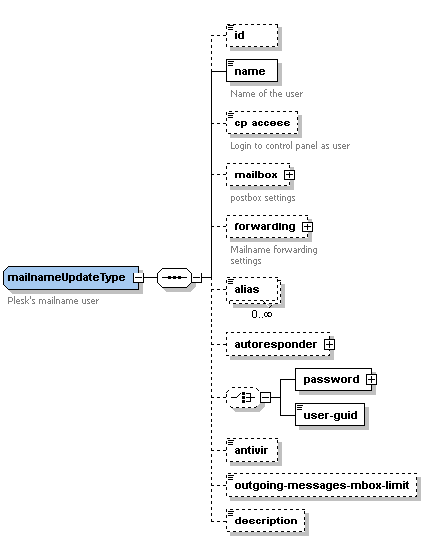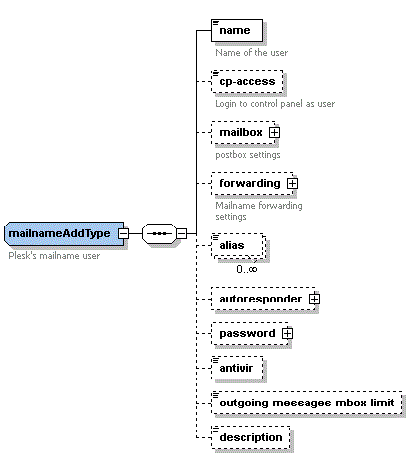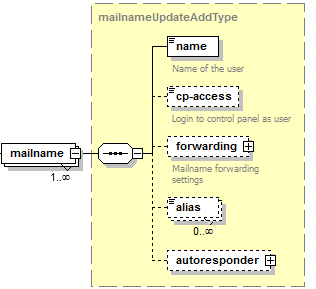Mail Account Settings
Mail account settings are specified by complex type
mailnameUpdateType, mailnameAddType, mailnameUpdateAddType in file
plesk_mailname.xsd. These types are used for different operations on
mail boxes. The mailnameUpdateType type contains the majority of the
nodes shared among these types. Its presentation is as follows:

-
The id node is optional. It specifies the identifier of the mail user (if this user already exists in Plesk database). Data type: integer.
-
The name node is required. It specifies the name of the mail user. Data type: string.
-
The cp-access node is optional. It specifies whether the mail account owner will be able to log in to Plesk with their mail address as the username and mail access password as the Plesk password. Data type: boolean.
-
The mailbox node is optional. It specifies a collection of mail box settings. Data type: none. See the structure of this node in the Mail Box Settings section.
-
The forwarding node is optional. It enables the redirect feature for the mail account and specifies the email address where the correspondence will be redirected. Data type: none. See the structure of this node in the Redirect Settings section.
-
The alias node is optional. It specifies an alternative name for the given mail name (e.g., the bob alias set for bfisher@example.com means that all mail sent to bob@example.com and to the original address will get to the same mail box). Data type: string.
-
The autoresponder node is optional. It defines a collection of automatic response messages and their settings that will be sent from the given mail account. Data type: none. See the structure of this node in the Automatic response settings section.
-
The password node is optional. It specifies the password used by mail user to access the mail box. Data type: string.
-
The user-guid node is optional. It specifies the mail user GUID. Data type: string.
-
The value node is optional. It specifies the mail box password. Data type: string.
-
The type node is optional. It specifies the type of the password. Data type: string. Allowed values: plain | crypt.
Note: By default, the ‘plain’ password type is used - it means the password as it is usually saved, and it is applicable in most situations. The ‘crypt’ type means the hashed password and can be used, for example, for migration purposes. The ‘crypt’ type can be used on Linux only. On Windows, only the ‘plain’ password type is supported.
-
The antivir node is optional. It specifies the antivirus protection settings for the incoming/outgoing correspondence. Data type: string. Allowed values: off | inout | in | out.
-
The outgoing-messages-mbox-limit node is optional. It specifies the allowed number of email messages that a mailbox can send per hour. Data type: integer.
-
The description node is optional. It specifies a description for a mail account. Data type: string.
The following sample packet creates a mail account and sets a collection of settings for it:
<packet>
<mail>
<create>
<filter>
<site-id>12</site-id>
<mailname>
<name>bfischer</name>
<mailbox>
<enabled>true</enabled>
<quota>10485760</quota>
</mailbox>
<alias>bob</alias>
<antivir>true</antivir>
</mailname>
</filter>
</create>
</mail>
</packet>
The mailnameAddType fields are the subset of mailnameUpdateType. It looks as follows:

The mailnameUpdateAddType complex type also does not have type-specific nodes, and it has the following representation:
